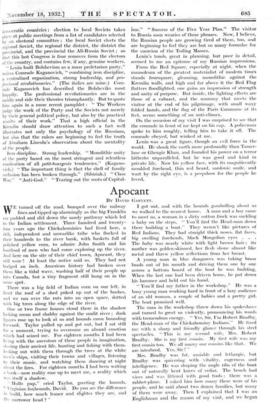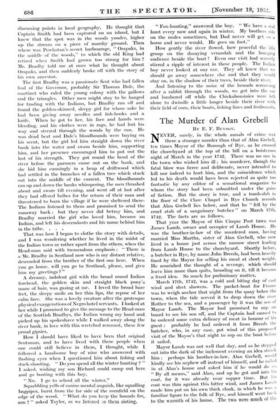Apo cant
GA RN ETT.
WE turned off the rOad, bumped over the railway lines and tipped up alarmingly as the big Franklin ear padded and slid down the sandy pathway which led to the Indian settlement. Three hundred and twenty- four years ago the Chickahominies had lived here, a rich, independent and unwarlike tribe who flocked in their hundreds to the river bank, with baskets full of Polished yellow corn, to admire John Smith and his boatload of men who had come exploring up the river. And here on the site of their chief town, Apoeant, they still were ! At least the notice said so. They had not budged an inch. American history had broken over them like a tidal wave, washing half of their people up into Canada, but a tiny fragment still hung on in the same spot.
There was a big field Of Indian corn on our left, in front the roof of a shed poked up out of the bushes, and we ran over the ruts into an open space, dotted with big trees along the edge of the river. One or two frame houses stood there in the shadow looking mean and shabby against the sunlit river ; dark figures rose up to look at us and hounds came bounding forward: Taylor pulled up and got out, but I sat still for a moment, trying to overcome an absurd emotion which had seized me. For eighteen months I had been living with the ancestors of .these people in imagination, sharing their ancient life, hunting and fishing with them. looking out with them through the trees at the white Inca's ships, visiting their towns and villages, listening to their music, and watching them dancing at night about the fires. For eighteen months I had been writing a book—now reality rose 'up to meet me, a reality which Was itself a shadow. Hullo pip," cried Taylor, greeting the hounds. "Virginian foxhounds, David. Do you see the difference Hi build, how much' leaner and slighter they are, and the narrower head ? " I got out, and with the hounds gambolling about us we walked to the nearest house. A man and a boy came to meet us, a woman in a dirty cotton frock was suckling a baby on the steps. " You'll find the Head-man down there building a boat." They weren't like pictures of Red Indians. They had straight thick noses, flat faces, big swelling foreheads, black Mongolian eyes . . . The baby was nearly white with light brown hair ; its mother was golden-skinned, her flesh shone almost like metal and threw yellow reflections from her breast.
A young man in blue dungarees was taking brass brads out of his mouth and driving them one by one across a bottom board of the boat he was building. When the last one had been driven home, he put down his hammer and held out his hand.
"You'll find my father in the workshop." He was a busy young man working hard in front of a lazy audience of an old woman, a couple of babies and a pretty girl. The boat promised well.
The man in the workshop threw down his spokeshave and turned to greet us violently, pronouncing his words with tremendous energy. "Yes, Sir, I'm Robert Bradby, the Head-man of the Chiekahominy Indians." He fixed me with a sharp and friendly glance through his steel spectacles. "This is my second wife, Mrs. Robert Bradby. She is my first cousin. My first wife was my first cousin too. We all marry our cousins like that. We are interbred. Yes, Sir ! "
Mrs. Bradby was fat, amiable and lethargic, but Bradby was quivering with vitality, eagerness and intelligence. He was shaping the angle ribs of the boat out of naturally. bent knees of cedar. The bench had vices and was littered with good tools : there was a rabbet-plane. I asked him how many there were of his people, and he said about two dozen families, but many of them were away. Then r explained that I was an Englishman and the reason of my visit, and we began discussing points -in local geography. He thought that Captain Smith had been captured on an island, brit I knew that the spot was in the woods yonder, higher up the stream on a piece of marshy ground: Then Where was Powhatan's secret harbourage, " Orapaks, in the middle of the woods," to which the old King had retired when Smith had grown too strong for him ? Mr. Bradby told me at once what he thought about Orapaks, and then suddenly broke off with the story of his own ancestor.
The first Bradby was a passionate Scot who had fallen foul of the Governor, probably Sir Thomas Dale, the martinet who ruled the young colony with the gallows and the triangles. Other men might stay to be hanged for trading with the Indians, but Bradby ran off and found the golden-skinned, sleepy girl for whose sake he had been giving away needles and fish-hooks and a knife. When he got to her, his face and hands were bleeding, and his clothes were in rags, he had lost his way and steered through the woods by the sun. He was dead beat and Dale's bloodhounds were baying on his scent, but the girl led him straight down the river bank into the water and swam beside him, supporting him, and her presence encouraged him to put out the last of his strength. They got round the bend of the river before the pursuers came out on the bank, and she hid him cunningly in a heap of driftwood which had settled in the branches of a fallen tree which stuck out into the middle of the current. The bloOdhounds .
ran up and down the banks whimpering, the men thrashed about and swore till evening, and went off at last after they had offered bribes for the return of their man and threatened to burn the village if he were sheltered there. The Indians listened to them and promised to send the runaway back ; but they never did betray him, and Bradby married the girl who loved him, became an Indian, and left his descendants and his name behind him in the tribe. . . .
That was how I began to clothe the story with details,.
and I was wondering whether he lived in the midst of the Indian town or rather apart from the others, when the Head-man said with tremendous emphasis : "There is a Mr. Bradby in Scotland now who is my distant relative, descended from the brother of the first one here. When you go home, will you go to Scotland, please, and give him my greetings ? "
A dreamy, indolent girl with the broad round Indian forehead, the golden skin and straight black pony's mane of hair, was gazing at me. I loved the broad bare feet, the sleepy smile on her thin lips, the repose of her calm face. She was a lovely creature after the grotesque physical exaggerations of Negro hotel servants. I looked at her while I promised to give the message to the Head-man of the Scottish Bradbys, the Indian wrung my hand and. picked up his spokeshave while I walked away along the • river bank, in love with this wretched remnant, these few proud gipsies.
How I should have liked to have been that original Scotsman, and to have lived with these people when one could still believe in them, I thought, while I. followed a handsome boy of nine who answered with flashing eyes when I questioned him about fishing and duck-shooting. "Do you spend all the winter hunting ? " I asked, wishing my son Richard could camp out here and go boating with this boy.
"No. I go to school all the winter."
Squabbling yells of canine mental anguish, like squalling bagpipes, burst from the far side of the cornfield on the edge of the wood. "What do you keep the hounds for, son ? " asked Taylor, as we listened 'to them rioting. "Fox-hunting," answered the boy. • We have a real hunt every now and again in winter. My brothers ride on the mules sometimes, but Dad never will get on a horse and never would. He goes on foot."
How gently the river flowed, how peaceful the idle group on the decaying verandah and the lounging audience beside the boat ! Even our visit had scarcely stirred a ripple of interest in these people. The Indian boy never looked at our car. They all knew that we should go away somewhere else and that they would stay on, in the shadow of their trees, beside their river.
And listening to the noise of the hounds screaming after a rabbit through the woods, we got into the ear and lumbered off while the Chicka.hominies were left alone to dwindle a little longer beside their river with their field of corn, their boats, fishing lines and foxhounds.

































































 Previous page
Previous page